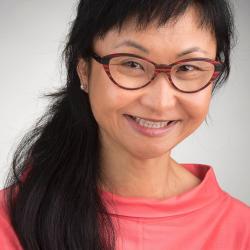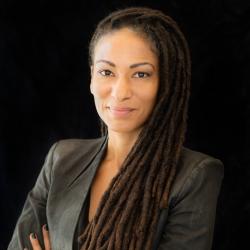2021 Summer School on the Histories of AI: A Genealogy of Power
-
WHEN: 12–16 July 2021
-
WHERE: Online
-
REGISTER: Here
Event Summary
This Summer School was entirely virtual. We hosted two sessions per day at hours designed to accommodate participants from a range of time zones.
Each day of the Summer School included two sessions. The first was a workshop that featured 'work in progress' presentations of new research by a handful of contributors to a recent call for papers for a BJHS journal special Issue on the Histories of Artificial Intelligence. We invited participants' feedback on these papers. The second was a keynote lecture on a working draft of new research followed by engagement with respondents and Q&A.
On 12 July, the opening day, we hosted a social 'Meet and Greet' Poster Session from 13:00-14:30 BST in which members of the community can meet each other and learn about each others' research projects. On 16 July, we hosted a closing event that allowed for social exchange and celebration of the Seminar.
Run of Show (condensed)
12 July - Monday
13:00-14:30 BST - Meet and Greet' E-Poster Sessions
Marina Hassapopoulou (New York University)
Back to the Future: Exploring Artificial Intelligence’s Creative Potential through Film Historiograph
Ranjini Raghavendra (Public Health Foundation of India)
Controversies around Covid-19 contact tracing app in India
Adriana da Rosa Amaral and Caroline Govari (UNISINOS University, Universidade do Vale do Rio dos Sinos)
Music & AI in Brazilian Scholarship: first observation
Hugo Felipe Idárraga Franco (Universidad de los Andes)
Critics on classification and control in artificial intelligence artistic practices
David I. Stokes (UCLA)
Experts Seeking Consensus: Scientific Professionalization, Collaboration and Processes
Ted Pedersen (University of Minnesota, Duluth)
Automatic Recognition of Hate Speech on Twitter - The Case of Ilhan Omar and Islamophobia
15:00-17:00 BST - Keynote by Prof. Wendy Chun (Simon Fraser University)
Respondent: Prof. Joy Rohde (University of Michigan)
Respondent: Prof. Ted Pedersen (University of Minnesota, Duluth)
13 July - Tuesday
13:00-14:30 BST - Workshop 1 'Pre 1960s: Origins?'
Chair: Richard Staley (University of Cambridge)
Sananda Sahoo (Western University)
Multiple Lives of Mahalanobis’ Biometric Data Travel as Biovalue to India’s Welfare State
Commentator: Aaron Mendon-Plasek (Columbia University)
Bo An (Yale University / Max Planck Institute for the History of Science)
A Critical History of Early Artificial Intelligence in the People's Republic of China (1950s-1980s)
Commentator: Flora Lysen (Maastricht University)
Aaron Mendon-Plasek (Columbia University)
How the idea of creativity in 1950s machine learning produces social and political possibility
Commentator: Jonnie Penn (University of Cambridge)
Jonnie Penn (University of Cambridge)
Animo Nullius: Locating AI’s Foundations in the Colonial Doctrine of Discover
Commentator: Bo An (Yale University / Max Planck Institute for the History of Science)
Flora Lysen (Maastricht University)
Histories of AI in image-based medicine: diagnostic assemblages in radiology (1950s – present)
Commentator: Sananda Sahoo (Western University)
15:00-17:00 BST - Keynote by Prof. Ruha Benjamin (Princeton University)
Respondent: Prof. Ronald R. Kline (Cornell University)
Respondent: Dr. Clarissa Ai Ling Lee (Universiti Malaya)
14 July - Wednesday
13:00-14:30 BST - Workshop 2 '1960-1970s: Interactions'
Chair: Matthew Jones (Columbia University)
Andrew Meade McGee (Carnegie Mellon University)
Institutions and AI: Organizational Capacity, Structures of Power, and Sites of Discourse in the Development of Artificial Intelligence as a Field, 1960-2020
Commentator: Sam Schirvar (University of Pennsylvania)
Rosamund Powell (University of Cambridge)
Positivism, power and politics: an exploration of disingenuous rhetoric in 1970s social critiques of machine intelligenc
Commentator: Andrew Meade McGee (Carnegie Mellon University)
Olessia Kirtchik (HSE University, Moscow)
The Soviet experiences with AI: if a machine cannot “think”, can it “rule”?
Commentator: Rosamund Powell (University of Cambridge)
Sam Schirvar (University of Pennsylvania)
From Man-Machine to Human-Computer Interaction: Psychologists, Secretaries, and the Personal Computer at Xerox PARC, 1973-1983
Commentator: Olessia Kirtchik (HSE University, Moscow)
15:00-17:00 BST - Keynote by Prof. Kalindi Vora (UC Davis)
Respondent: Prof. Lucy Suchman (Lancaster University)
Respondent: Os Keyes (University of Washington)
15 July - Thursday
13:00-14:30 BST - Workshop 3 '1980-1990s: Disciplining ideologies'
Chair: Stephanie Dick (University of Pennsylvania)
Michael Castelle (University of Warwick)
Are Neural Networks Neoclassical? The Economic Origins of Contemporary AI
Commentator: Harry Law (University of Cambridge)
Luke Stark (Western University)
Artificial Intelligence and the Conjectural Science
Commentator: Michael Castelle (University of Warwick)
Harry Law (University of Cambridge)
Reading Machines: Bell Labs and the Neural Network ‘Revolution
Commentator: Youjung Shin (Korea Advanced Institute of Science and Technology)
Youjung Shin (Korea Advanced Institute of Science and Technology)
Scientific Pluralism and New Possibilities of AI?: The Rise and Fall of 'Soft Science' in South Korea in the 1990
Commentator: Luke Stark (Western University)
15:00-17:00 BST - Keynote by Prof. Ulises A. Mejias (SUNY Oswego)
Respondent: Prof. Hunter Heyck (University of Oklahoma)
16 July - Friday
13:00-14:30 BST - Workshop 4 - 2000-2020s: Search and monitor
Chair: Syed Mustafa Ali (The Open University), Sarah Dillon (University of Cambridge)
Alexa Hagerty (University of Cambridge), Florencia Aranda, Diego Jemio
Algorithmic Expectations: Foresight and Predestination in a Predictive Model for Teenage Pregnanc
Commentator: Fernando Delgado (Cornell University)
Fernando Delgado (Cornell University)
Domain Search: Prospecting the Profession
Commentator: Simon Taylor (UNSW Sydney, Australia)
Simon Taylor (UNSW Sydney, Australia)
Agri-cultures of AI: how monitoring animals optimises AI labour management strategies
Commentator: Bruno Moreschi (University of São Paulo, Brazil)
Bruno Moreschi (Group on Artificial Intelligence and Art (GAIA) and Faculty of Architecture and Urbanism - University of São Paulo, Brazil)
Beyond visual surfaces – What and how to see the images that train commercial Computer Vision
Commentator: Alexa Hagerty (University of Cambridge)
15:00-17:00 BST - Closing Meeting
A celebration of the Seminar's activities over the past year. We will enjoy a variety of artistic works chosen or created by Seminar participants that inform understandings of AI.
Run of Show (expanded)
On 12 July, the opening day, we hosted a social 'Meet and Greet' Poster Session from 13:00-14:30 BST in which members of the community met each other and learned about each others' research projects.
Prof. Chun presented material from her forthcoming book, Discriminating Data: Neighbourhoods, Individuals and Proxies.
Wendy Hui Kyong Chun is the Canada 150 Research Chair in New Media at Simon Fraser University, and leads the Digital Democracies Institute which was launched in 2019. The Institute aims to integrate research in the humanities and data sciences to address questions of equality and social justice in order to combat the proliferation of online “echo chambers,” abusive language, discriminatory algorithms and mis/disinformation by fostering critical and creative user practices and alternative paradigms for connection. It has four distinct research streams all led by Dr. Chun: Beyond Verification which looks at authenticity and the spread of disinformation; From Hate to Agonism, focusing on fostering democratic exchange online; Desegregating Network Neighbourhoods, combatting homophily across platforms; and Discriminating Data: Neighbourhoods, Individuals and Proxies, investigating the centrality of race, gender, class and sexuality to big data and network analytics.
Dr. Chun is also the author of Updating to Remain the Same: Habitual New Media (2016), Programmed Visions: Software and Memory (2011), and Control and Freedom: Power and Paranoia in the Age of Fiber Optics (2006), as well as numerous articles and edited collections. She has received fellowships from various foundations and institutes, including the Guggenheim Foundation, ACLS, American Academy of Berlin, Radcliffe Institute for Advanced Study at Harvard. She was Professor and Chair of Modern Culture and Media at Brown University, where she worked for almost two decades. Currently, Dr. Chun works with the Digital Democracies Institute to undertake the proliferation of misinformation, abusive language and discriminatory algorithms. Through the investigation of natural language processing (NLP), political theory and critical data studies, the group aims to develop methods for creating effective online counterspeech and alternative models for connection.
Respondent: Prof. Joy Rohde (University of Michigan)
Respondent: Ted Pedersen (University of Minnesota, Duluth)
Chair: Richard Staley (University of Cambridge)
Multiple Lives of Mahalanobis’ Biometric Data Travel as Biovalue to India’s Welfare State
Sananda Sahoo (Western University)
Commentator: Aaron Mendon-Plasek (Columbia University)
A Critical History of Early Artificial Intelligence in the People's Republic of China (1950s-1980s)
Bo An (Yale University / Max Planck Institute for the History of Science)
Commentator: Flora Lysen (Maastricht University)
How the idea of creativity in 1950s machine learning produces social and political possibility
Aaron Mendon-Plasek (Columbia University)
Commentator: Jonnie Penn (University of Cambridge)
Animo Nullius: Locating AI’s Foundations in the Colonial Doctrine of Discovery
Jonnie Penn (University of Cambridge)
Commentator: Bo An (Yale University / Max Planck Institute for the History of Science)
Histories of AI in image-based medicine: diagnostic assemblages in radiology (1950s – present)
Flora Lysen (Maastricht University)
Commentator: Sananda Sahoo (Western University)
Prof. Benjamin presented work in progress material following the success of her most recent book, Race After Technology
Ruha Benjamin is a professor of African American studies at Princeton University, founding director of the IDA B. WELLS Just Data Lab and author of two books, People’s Science and Race After Technology, and editor of Captivating Technology. Prof. Benjamin is currently working on a fourth book, Viral Justice: How We Grow the World We Want. She writes, teach, and speak widely about the relationship between innovation and inequity, knowledge and power, race and citizenship, health and justice.
Respondent: Prof. Ronald R. Kline (Cornell University)
Respondent: Dr. Clarissa Ai Ling Lee (University of Michigan)
Chair: Matthew Jones (Columbia University)
Institutions and AI: Organizational Capacity, Structures of Power, and Sites of Discourse in the Development of Artificial Intelligence as a Field, 1960-2020
Andrew Meade McGee (Carnegie Mellon University)
Commentator: Sam Schirvar (University of Pennsylvania)
Positivism, power and politics: an exploration of disingenuous rhetoric in 1970s social critiques of machine intelligence
Rosamund Powell (University of Cambridge)
Commentator: Andrew Meade McGee (Carnegie Mellon University)
The Soviet experiences with AI: if a machine cannot “think”, can it “rule”?
Olessia Kirtchik (HSE University, Moscow)
Commentator: Rosamund Powell (University of Cambridge)
From Man-Machine to Human-Computer Interaction: Psychologists, Secretaries, and the Personal Computer at Xerox PARC, 1973-1983
Sam Schirvar (University of Pennsylvania)
Commentator: Olessia Kirtchik (HSE University, Moscow)
Prof. Vora presented work in progress material following the success of her most recent book, Surrogate Humanity: Race, Robots, and the Politics of Technological Futures (co-authored with Neda Atanasoski)
Kalindi Vora is Professor of Gender, Sexuality and Women’s Studies at UC Davis, and Director of the Feminist Research Institute. She previously taught at UC San Diego Ethnic Studies and was affiliated with the Science Studies Program and the Critical Gender Program. Her current research includes ongoing writing on legal and social justice concerns connected to assisted reproductive technologies in the transnational commercial surrogacy, on autoimmunity and patient self-tracking and self-treatment, and on establishing models for “feminist science shops” at UC Universities. She has also just completed a co-edited book project on the racial and gendered politics informing contemporary robotics and artificial intelligence design with Neda Atanasoski for a book entitled, Surrogate Humanity (Duke University Press, forthcoming). She has a PhD in History of Consciousness from UC Santa Cruz (Feminist Studies) and an MA in Cultural Anthropology from the University of Hawai‘I Manoa, and a BA in Music/Religion from Wesleyan University. She held the UC President’s Postdoctoral Fellowship at UC Berkeley Anthropology.
Respondant: Prof. Lucy Suchman (Lancaster University)
Respondent: Os Keyes (University of Washington)
Chair: Stephanie Dick (University of Pennsylvania)
Are Neural Networks Neoclassical? The Economic Origins of Contemporary AI
Michael Castelle (University of Warwick)
Commentator: Harry Law (University of Cambridge)
Artificial Intelligence and the Conjectural Sciences
Luke Stark (Western University)
Commentator: Michael Castelle (University of Warwick)
Reading Machines: Bell Labs and the Neural Network ‘Revolution’
Harry Law (University of Cambridge)
Commentator: Youjung Shin (Korea Advanced Institute of Science and Technology)
Scientific Pluralism and New Possibilities of AI?: The Rise and Fall of 'Soft Science' in South Korea in the 1990s
Youjung Shin (Korea Advanced Institute of Science and Technology)
Commentator: Luke Stark (Western University)
Prof. Mejias presented work in progress material following the success of his most recent book, The Costs of Connection How Data Is Colonizing Human Life and Appropriating It for Capitalism (co-authored with Nick Couldry)
Prof. Mejias
is a professor of Communication Studies and the director of the Institute for Global Engagement at SUNY Oswego. He is co-founder of the Non-Aligned Technologies Movement and the network Tierra Común. He serves on the Board of Directors of Humanities New York, a National Endowment for the Humanities affiliate.His research interests include critical internet studies, network theory and science, philosophy of technology, sociology of communication, and political economy of digital media.
His most recent book, co-authored with Nick Couldry, is The Costs of Connection: How Data is Colonizing Human Life and Appropriating it for Capitalism. It is available from Stanford University Press. My previous book, Off the Network: Disrupting the Digital World (2013), was published by University of Minnesota Press.
Respondent: Prof. Hunter Heyck (University of Oklahoma)
Chair: Syed Mustafa Ali (The Open University), Sarah Dillon (University of Cambridge)
Algorithmic Expectations: Foresight and Predestination in a Predictive Model for Teenage Pregnancy
Alexa Hagerty (University of Cambridge), Florencia Aranda, Diego Jemio
Commentator: Fernando Delgado (Cornell University)
Domain Search: Prospecting the Professions
Fernando Delgado (Cornell University)
Commentator: Simon Taylor (UNSW Sydney, Australia)
Agri-cultures of AI: how monitoring animals optimises AI labour management strategies.
Simon Taylor (UNSW Sydney, Australia)
Commentator: Bruno Moreschi (University of São Paulo, Brazil)
Beyond visual surfaces – What and how to see the images that train commercial Computer Vision
Bruno Moreschi (Group on Artificial Intelligence and Art (GAIA) and Faculty of Architecture and Urbanism - University of São Paulo, Brazil)
Commentator: Alexa Hagerty (University of Cambridge)
A celebration of the Seminar's activities over the past year. We enjoyed a variety of artistic works chosen or created by Seminar participants that inform understandings of AI.





